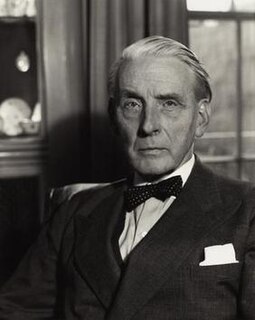Henry Vaughan was a Welsh metaphysical poet, author, translator and physician, who wrote in English. He is chiefly known for the religious poetry contained in Silex Scintillans, published in 1650, with a second part published in 1655. In 1646 his Poems, with the Tenth Satyre of Juvenal Englished was published, followed by a second volume in 1647. Meanwhile, he had been "converted" by reading the religious poet George Herbert and gave up "idle verse". The prose Mount of Olives: or, Solitary Devotions (1652) show the depth of his religious convictions and the authenticity of his poetic genius. Two more volumes of secular verse were published, ostensibly without his sanction; but it is his religious verse that has become acclaimed. He also translated short moral and religious works and two medical works in prose. At some time in the 1650s he began to practise medicine and continued to do so throughout his life.

Anglo-Welsh literature and Welsh writing in English are terms used to describe works written in the English language by Welsh writers. It has been recognised as a distinctive entity only since the 20th century. The need for a separate identity for this kind of writing arose because of the parallel development of modern Welsh-language literature; as such it is perhaps the youngest branch of English-language literature in the British Isles.

Charles Langbridge Morgan was a British playwright and novelist of English and Welsh parentage. The main themes of his work were, as he himself put it, "Art, Love, and Death", and the relation between them. Themes of individual novels range from the paradoxes of freedom, through passionate love seen from within and without, to the conflict of good and evil and the enchanted boundary of death (Sparkenbroke). He was the husband of Welsh novelist Hilda Vaughan.
Leslie Thomas, OBE was a Welsh author best known for his comic novel The Virgin Soldiers.
Harvest Home may refer to:
Janey King is a British journalist and romance novelist, writing under the pseudonym of Rosie Thomas. She is the author of 20 novels and ranks among the top 100 authors whose books are borrowed from United Kingdom libraries. She is a two-time winner of the Romantic Novel of the Year award.

The Citadel is a 1983 BBC television adaptation written by Don Shaw from A. J. Cronin's novel The Citadel, which was originally published in 1937. It was produced by Ken Riddington. The miniseries was directed by Peter Jefferies and Mike Vardy.
This article is about the particular significance of the year 1926 to Wales and its people.

Richard Vaughan was a Welsh bishop of the Church of England.

Llangattock is a village, community and electoral ward in the Brecon Beacons National Park in Powys, Wales. It lies in the Usk Valley just across the river from the town of Crickhowell. The Monmouthshire and Brecon Canal passes through the village en route between Brecon and Pontypool. It is in the historic county of Breconshire.

Derek Vaughan was elected as Labour Party Member of the European Parliament for Wales in the 2009 European Parliament election.

Angharad Tomos is a Welsh author and prominent language activist. She is a recipient of the Tir na n-Og Award.
Thomas Lowten Jenkins (1812–1869) was an English barrister and rower who twice won the Wingfield Sculls, the amateur championship of the River Thames.
Elis Gruffydd (1490–1552), sometimes known as "The soldier of Calais", was a Welsh chronicler, transcriber, and translator. He is known foremost for his massive chronicle Cronicl o Wech Oesoedd, which covers the history of the world from the beginning of Adam and Eve up to the year 1552 and contains the earliest text of the Tale of Taliesin. He is also well known for his eyewitness account of England's 1543 war with France in his journal transcribed in Elis Gruffydd and the 1544 'Enterprise' of Paris and Boulogue. His presence on the battlefield has given insight into the development of protests against the campaign. Thomas Jones says "despite his long years of service in France and London, [Gruffydd] was deeply interested in the oral traditions and written literature of his native land. He quotes Welsh englynion and proverbs, records a few folk-tales, and transcribes Welsh texts from such MSS as he had at his disposal". Gruffydd is an excellent source in uncovering lost and obscure traditions and he serves as a harmoniser for Welsh traditions appearing in different ages by the same poet, such as Merlin and Taliesin.
George Owen was a Welsh officer of arms, York herald from 1633.
The Battle to the Weak is a novel by Welsh-born writer Hilda Vaughan.
The Invader: a tale of adventure and passion is a novel by Welsh author Hilda Vaughan.
Elizabeth Baker was a British diarist.

The Soldier and the Gentlewoman is a 1932 novel by Welsh English-language writer Hilda Vaughan.







